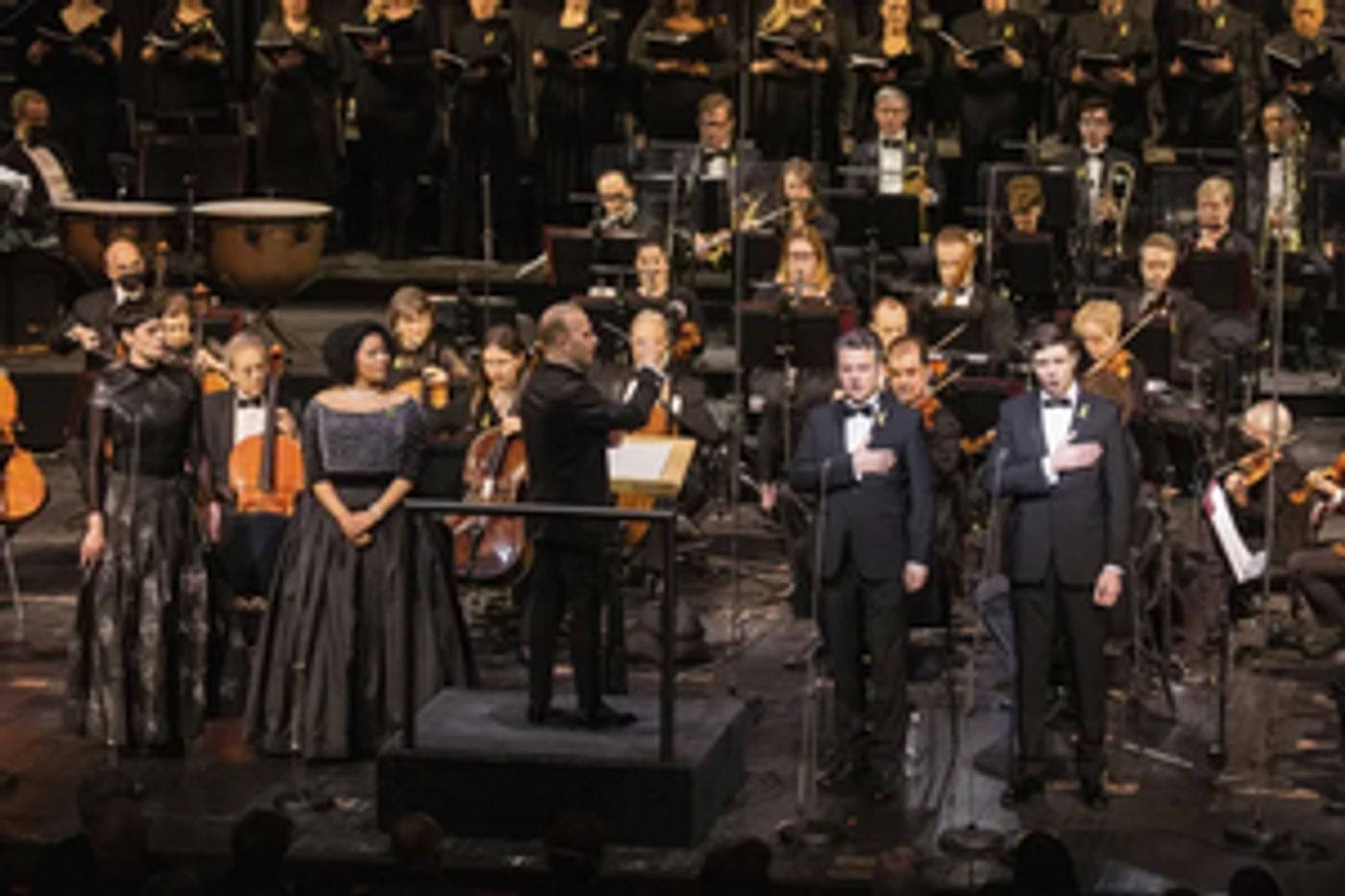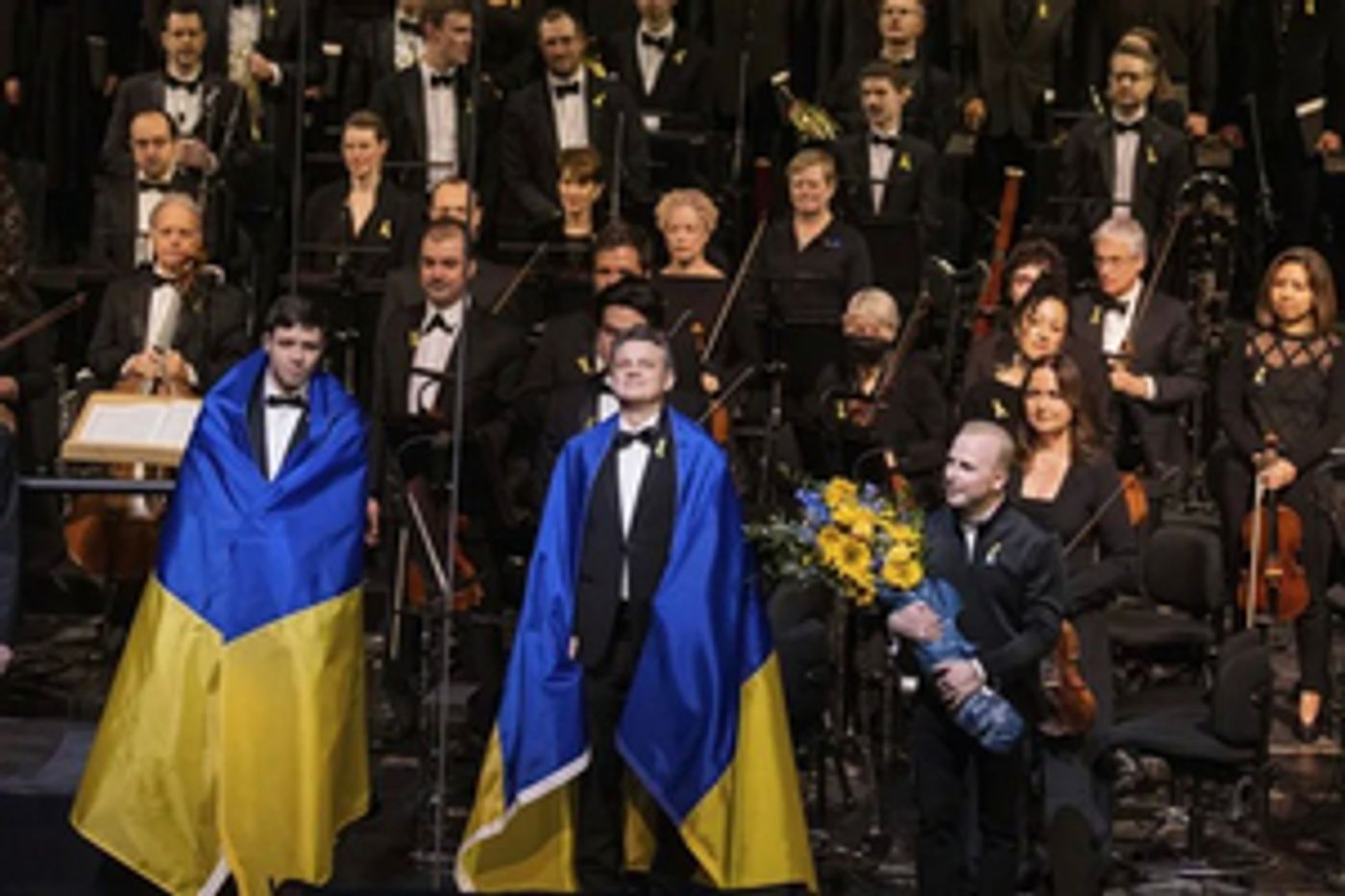Review: Met Opera Continues Support of Ukraine with CONCERT OF REMEMBRANCE
Soloists Golda Schultz, Emily D’Angelo, Dmytro Popov and Vladyslav Buialskyi Join Maestro Nezet-Seguin, Met Orchestra and Chorus

Photo: Evan Silvermann/The Met
Friday night, the Metropolitan Opera gave its second concert honoring "Ukraine and its brave citizens as they fight to defend their country and cultural heritage." The country's colors flew above the performance and opening with a pretaped video message from First Lady, Olena Zelenska, along with the Ukraine national anthem. She remarked that the concert wasn't really marking the one-year anniversary of the horrendous, illegal conflict (although, indeed, it did), but a time closer to peace for its people.
Friday night, the Metropolitan Opera gave its second concert honoring "Ukraine and its brave citizens as they fight to defend their country and cultural heritage." The country's colors flew above the performance and opening with a pretaped video message from First Lady, Olena Zelenska, along with the Ukraine national anthem. She remarked that the concert wasn't really marking the one-year anniversary of the horrendous, illegal conflict (although, indeed, it did), but a time closer to peace for its citizenry.

holding flowers. Photo: Evan Zimmerman/The Met
Sandwiched in between the anthem and Valentin Silvestrov's touching "Prayer for Ukraine," which brought the concert to an end, were major works by Mozart and Beethoven, performed by the Met Orchestra and Chorus and a quartet of soloists, under Music Director Yannick Nezet-Seguin.
Mozart's REQUIEM--left unfinished at his death in 1791 and, according to his wife, was written it for the composer's own funeral (thought it was commissioned by an Austrian aristocrat, Count Franz von Walsegg)--has often been used to express grief after tragedies.
To many, however, it is his most famous piece, tied inexorably to the film of Peter Schaffer's biographical play AMADEUS. That was despite the fact that much of Requiem was cobbled together by one of Mozart's students, FX Sussmayr. Only about half of it was complete at the composer's death, though a roadmap and scraps of paper were probably left for Sussmayr to work with. The Introdictus and Kyrie are believed to have been finished by his hand, as were the Dies irae and Hostias movements.
The work was finished the year after Mozart died and performed at Walsegg's home, though Constanze Mozart beat him to the punch and arranged for a performance of her own to make it clear this was her husband's work, since the Count was known for taking credit for compositions he commissioned.
Whoever did what in completing the mass, Mozart's hand is unmistakably there in certain parts, as if they could have fit into DON GIOVANNI or NOZZE DI FIGARO. The evening's soloists--soprano Golda Schultz, mezzo Emily D'Angelo, tenor Dmytro Popov and bass-baritone Vladyslav Buialskyi--did fine work in honoring the memory of the composer (as well as Ukraine), most notably in the Tuba mirum section of the Sequentia and the Recordare movement of the Sequencia.
Schultz seemed overwhelmed at times by the nature of the work and evening, though her creamy voice never let up, while the pungent voice of mezzo D'Angelo was the perfect counterpoint. (Her black dress was a stunner: marked as if noting the war's body count on a chalkboard.) The two men, both Ukrainian, the tenor soaring, the bass-baritone digging deeply, appeared more demure during the concert, as if they might be overwhelmed by its nature, but returned, joyously, for curtain calls draped in the Ukraine flag.
The Met chorus, under Donald Palumbo, sang brilliantly as soloists in much of the piece, with some exquisite counterpoint work. Nezet-Seguin led the combined forces of the chorus and the wonderful musicians of the orchestra in a performance throbbing with subtlety and strength.
The Beethoven, however, was puzzling. The conductor took it at a pace as if there was a fire lit beneath him, though the orchestra were willing to play his game and kept up with him without coming up for air. It made Silvestrov's "Prayer" stand out even more, bringing the evening to a suddenly calm conclusion, with faith and hope for the future.
Reader Reviews
Videos

